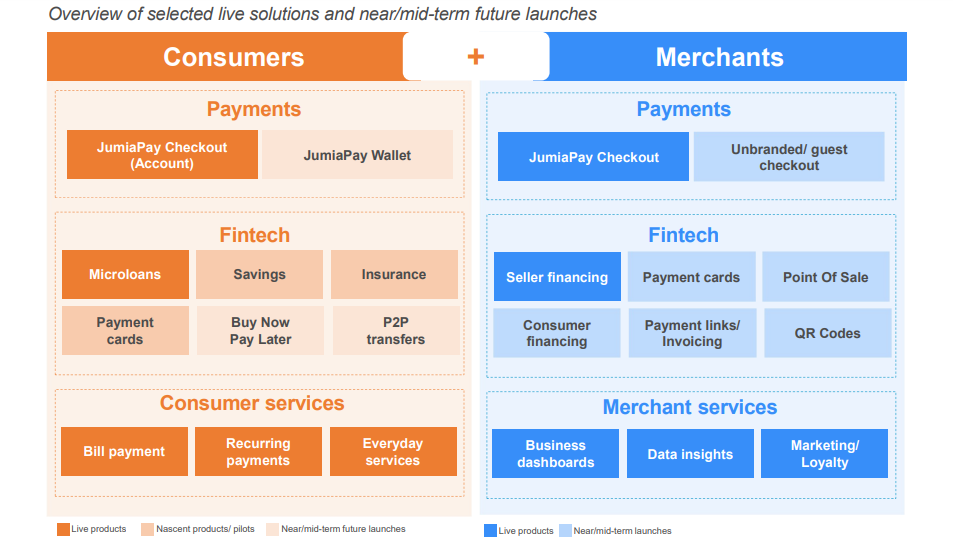CATEGORIES
REFUND POLICY
DELIVERY POLICY
After 10 years, Jumia is more than an eCommerce company



Over the past decade, the tribulations of MallforAfrica, Konga, or Payporte have served as a reminder that companies can and do disappear. The thriving companies of today are not the same as those of yesterday.
Fifty-four percent of African startups founded between 2010 and 2018 shut down, according to the 2020 Better Africa report. Globally, 90% of new startups fail and 75% of venture-backed startups fail, per Zippia. Under 50% of new businesses make it to their fifth year, and 33% of startups make it to the 10-year mark.
Despite this high failure rate and the arduous nature of building startups, Africa’s foremost eCommerce platform, Jumia celebrated its tenth-year anniversary in June 2022.
Over the years, Jumia has become a poster child of startup success on the African continent. It became Africa’s first tech unicorn in 2016 and then went on to get listed on the New York Stock Exchange (NYSE) three years later. The company has also provided thousands of jobs for Africans. It currently has 1,000 employees, more than 10,000 independent sales agents, and 350 third-party logistics partners. Jumia has also helped over 100,000 SMEs come online across Africa since its inception.
“From the beginning, we wanted to improve people’s lives through the internet, we had a big ambition and we saw potential in Nigeria and Africa,” Massimiliano Spalazzi, CEO Jumia Nigeria, told TechCabal over a call.
These noteworthy feats have made many describe Jumia, which operates across 11 African countries, as the Amazon of Africa, a description Spalazzi would rather not adopt.
“I’d refer to us as Jumia,” he said.
Ade Atobatele, CEO of Remarkable Ideas, agrees with this as he believes Jumia started off as a clone of Amazon but hasn’t become all that the $1.3 trillion multi-sector behemoth is.
“The imitation of Amazon is a trap that restricts Jumia. It has to look beyond the Amazon model,” Atobatele said.
To understand what makes Jumia different from many other African startups and what the next 10 years could look like for the company whose sole mission is to improve the lives of people through the internet, let’s take a walk down memory lane.
Remember Africa Internet Group?
In 2012, two Mckinsey consultants, Sacha Poignonnec and Jeremy Hodara, alongside Raphael Kofi Afaedor and Tunde Kehinde who held marketing and sales roles at Notore Chemicals Industries and Diageo came together to co-found Jumia.
Jumia was initially a prominent business under Africa Internet Group (AIG), a parent company that housed 71 different companies across 26 African countries, including the online delivery service, Hellofood, a hotel booking company called Jovago, and the ride-hailing service, Easy Taxi.
AIG’s model was seen as a clone of its main backer, Rocket Internet, a European company which incubated and invested in companies. The strategy was to back startups which replicated the business models of other established, successful companies around the world. The expectation was that these startups would grow to dominate the markets they existed in or be acquired by the likes of Amazon or Uber.
Jumia, which was the biggest of the group’s businesses, was launched in Nigeria and within the first three years expanded to Algeria, Cameroon, Egypt, Ghana, Ivory Coast, Kenya, Morocco, Senegal, Tanzania, and Uganda. Within its first four years, AIG raised $493 million from Goldman Sachs, AXA, MTN, Orange, and Rocket Internet, reaching a $1 billion valuation (unicorn status) by March 2016.
Prior to the attainment of its unicorn status, there was some restructuring and rebranding at AIG. This included staff lay-offs and the replacement of the heads of Kaymu, Jovago, Easy Taxi, and Lamudi. The group’s brand name was also changed to Jumia, and the other companies adopted the Jumia brand name. Jovago became Jumia Travel, Lamudi became Jumia House, HelloFood morphed into Jumia Food, Carmudi became Jumia Cars, Vendito became Jumia Deals, and Everjobs became Jumia Jobs.
After Jumia was listed on the NYSE in 2019, it exited a few markets such as Cameroon and Tanzania in the bid to consolidate its efforts and resources on more profitable markets. The company also handed over the reins of its Jumia Travel subsidiary to Travelstart through a distribution and commercial agreement.
Losses and challenges on the path to profitability
These changes were important for Jumia’s growth and survival as the company was hemorrhaging millions of dollars annually.
Jumia has been making losses since its inception, losses it could afford to make because it raised almost half a billion in venture capital funding. This heavy loss-incurring route is often seen as a conventional one taken by VC-backed startups on the journey to conquering the market.
To put this into context, it took Amazon nine years to break even; and, as for Uber, throughout its existence, the ride-hailing giant has only reported profit once, in 2018. Jumia’s closest competitor on the continent, Konga, which raised a total of $79.5 million in VC funding, was acquired by Zinox for an undisclosed sum—an amount rumoured to be at a great loss to investors.
REPORTS: https://techcabal.com/2022/08/29/after-10-years-jumia-ecommerce-amazon/

